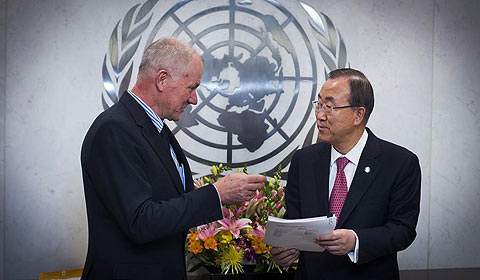|
 |
|
Ake Sellstrom (L), Head of the United Nations Mission to Investigate Allegations of the Use of Chemical Weapons in the Syrian Arab Republic, hands his report over to Secretary-General of the United Nations Ban Ki-moon at the United Nations headquarters in New York December 12, 2013. [Photo/Agencies] |
UNITED NATIONS - The joint team of the United Nations-Organization for the Prohibition of Chemical Weapons (OPCW) said on Thursday it "concludes that chemical weapons have been used in the ongoing conflict between the parties in the Syrian Arab Republic."
The conclusion was contained in the 82-page final report of an international probe into the alleged chemical weapons attacks in Syria.
The report, which was originally expected in late October, was posted on the website of the UN Office for Disarmament Affairs shortly after it was presented to UN Secretary-General Ban Ki-moon here Thursday by Ake Sellstrom, the head of an international probe into the alleged use of chemical weapons attacks in the Syrian conflict.
Sellstrom is a Swedish scientist, an expert in chemical weapons. Sellstrom was accompanied by his team leaders from the OPCW and the World Health Organization (WHO) in presenting the report in Ban's conference room at the UN headquarters. His team is separate from the operation of the OPCW mandated by the UN Security Council in Resolution 2118 in September to rid Syria of chemical weapons by the middle of next year.
The Sellstrom team was set up in response to allegations of chemical weapons being used in Syria by both the government and opposition forces.
UN spokesman Martin Nesirky said earlier it was up to the UN Security Council to determine what, if any, course of action was necessary.
Ban commended Sellstrom and his team "for their important and courageous work. They have carried out their tasks with the highest degree of professionalism, and did so in the face of many dangers."
"Much has happened since the first allegations of the use of chemical weapons in Syria in March of this year," the secretary- general said. "The Syrian government acknowledged that it possessed chemical weapons and subsequently joined the Chemical Weapons Convention," he said.
"An OPCW-UN Joint Mission was established and continues to oversee the timely elimination of Syria's chemical weapons program in the safest and most secure manner possible."
"The use of chemical weapons is a grave violation of international law and an affront to our shared humanity," Ban said.
"We need to remain vigilant to ensure that these awful weapons are eliminated, not only in Syria, but everywhere." The Syrian government first lodged complaints over the illegal use by opposition fighters of chemical weapons on the town of Khan al-Assal, near Aleppo, in March.
It was almost immediately followed by accusations from Britain, France and the United States of two chemical weapons attacks on opposition forces. The United Nations then negotiated with Damascus for the Sellstrom team to investigate the allegations.
No sooner the team was in Damascus than a massive alleged chemical weapons attack was reported in Ghouta, near the Syrian capital city, on August 21, which killed as many as 1,400 people.
Ban then ordered Sellstrom to prioritize investigation of the Ghouta attack. The Ghouta attack prompted US President Barack Obama to threaten military strikes against Syria as he said Washington had knowledge that the Syrian government carried out the attack, However, Syria's main supporter in the UN Security Council, Russia, said it had evidence rebels carried out the chemical weapons attack in Ghouta to gain sympathy.
After the Ghouta attack, Syria admitted it had chemical weapons and applied to join the OPCW and the Chemical Weapons Convention. Damascus said it was surrendering all its chemical weapons and the OPCW has an ongoing operation to ensure Syria destroys its chemical weapons plants and storage facilities and gets rid of chemical weapons by mid-2014, all overseen by the OPCW.
Plans are being laid to break the chemical weapons down into chemical agents, transport them to the Syrian port of Latakia, put them on a Danish or Norwegian ship which would take them to a second, as yet undetermined, port for "trans-loading" onto a US Navy ship for final disposal. Details were being worked out, according to UN officials.
|
|
|
|
|
|
|
|
